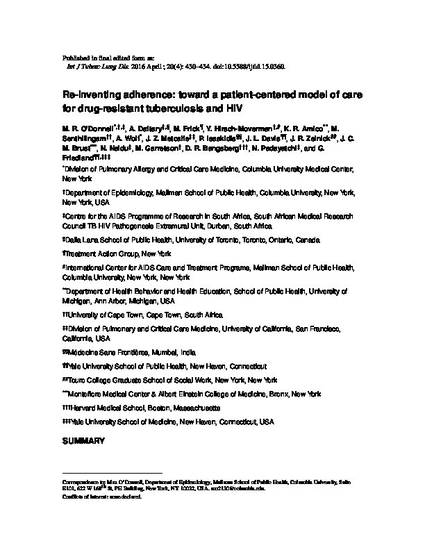
- Multidrug-resistant tuberculosis,
- Tuberculosis -- Treatment,
- Patient compliance,
- Patient-centered health care,
- HIV infections
BACKGROUND—Despite renewed focus on molecular tuberculosis (TB) diagnostics and new antimycobacterial agents, treatment outcomes for patients co-infected with drug-resistant TB and human immunodeficiency virus (HIV) remain dismal, in part due to lack of focus on medication adherence as part of a patient-centered continuum of care.
OBJECTIVE—To review current barriers to drug-resistant TB-HIV treatment and propose an alternative model to conventional approaches to treatment support.
DISCUSSION—Current national TB control programs rely heavily on directly observed therapy (DOT) as the centerpiece of treatment delivery and adherence support. Medication adherence and care for drug-resistant TB-HIV could be improved by fully implementing team-based patient-centered care, empowering patients through counseling and support, maintaining a rights-based approach while acknowledging the responsibility of health care systems in providing comprehensive care, and prioritizing critical research gaps.
CONCLUSION—It is time to re-invent our understanding of adherence in drug-resistant TB and HIV by focusing attention on the complex clinical, behavioral, social, and structural needs of affected patients and communities.

Author's version of an article that was subsequently published in the International Journal of Tuberculosis and Lung Disease, 2016 April; 20(4): 430-434, published by the International Union Against Tuberculosis and Lung Disease. May be accessed at http://doi.org/10.5588/ijtld.15.0360.
At the time of writing, David Bansberg was affiliated with Harvard Medical School.